SPECIAL REPORT: By Tony Fala
Community organisers representing multiple Aotearoa struggles gathered at the Ponsonby Community Centre in Tāmaki Makaurau last Sunday to celebrate the 50th anniversary of the founding of the Ponsonby People’s Union (1972-1979).
Organised by former PPU activists, representatives of many Aotearoa social justice movements and struggles from around the country came together to honour the PPU’s work.
The gathering was simultaneously a birthday celebration; a communal remembering of activist history, and a hui to launch the important PPU commemorative book project.
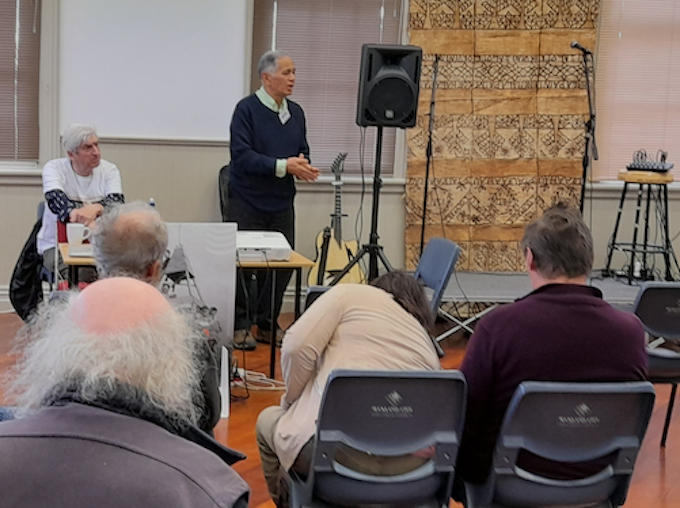
Taura Eruera was a founding member of Nga Tamatoa and the PPU, doing important food co-op work for the union. He opened the hui with a mihi whakatau.
PPU activist Farrell Cleary chaired the meeting and provided excellent introductions for all speakers.
The speakers
Roger Fowler co-founded the PPU and coordinated the group between 1972-1979. He spoke of how the PPU emerged from the Aotearoa countercultural movement; growing public opposition to the Vietnam War; Progressive Youth Movement activism, and Resistance Bookshop labours in Auckland.
Fowler paid tribute to his friend and PPU co-founder Cliff Kelsell. He acknowledged the writings of the Black Panther Party as formative to thinking concerning community activism — in particular, the writings of Huey P. Newton, Bobby Seale, and George Jackson.
Fowler explained why Huey P. Newton’s concept of “intercommunalism” was vital for developing the PPU’s community resilience and network building praxis in Ponsonby from 1972.
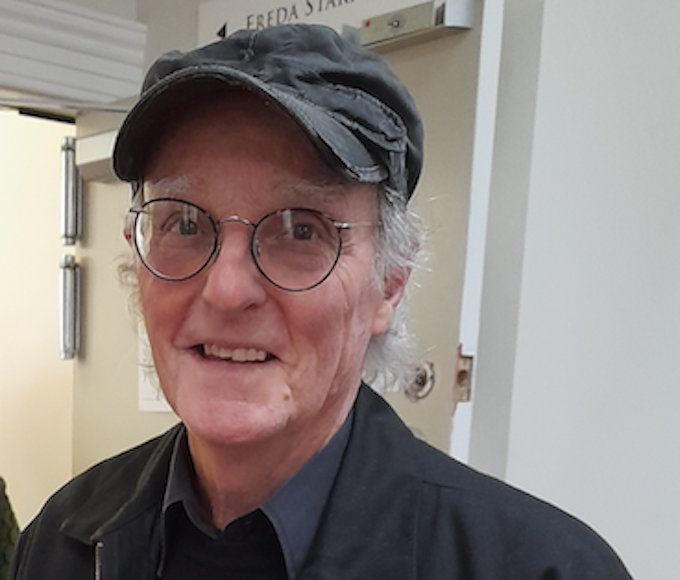
He said the issues the Ponsonby community confronted were:
- people needing food;
- people needing protection from police harassment and racism; and
- local tenants needing assistance against unjust treatment from property owners.
Fowler spoke about the PPU’s food co-op, prison visitors bus service, and free community newspaper and leaflet work. He said the PPU used the food co-op as an organising tool to mobilise people for multiple community interventions.
He expressed concern that knowledge of activism in the seventies may be disappearing — but he acknowledged Nick Bollinger’s recent history Jumping Sundays as an important addition to keeping public memory of activist history alive.
Fowler paid tribute to the Polynesian Panther Party (PPP) — the PPU’s sister organisation — and acknowledged the Polynesian Panther Party Legacy Trust’s (PPPLT) contemporary community organising in schools.
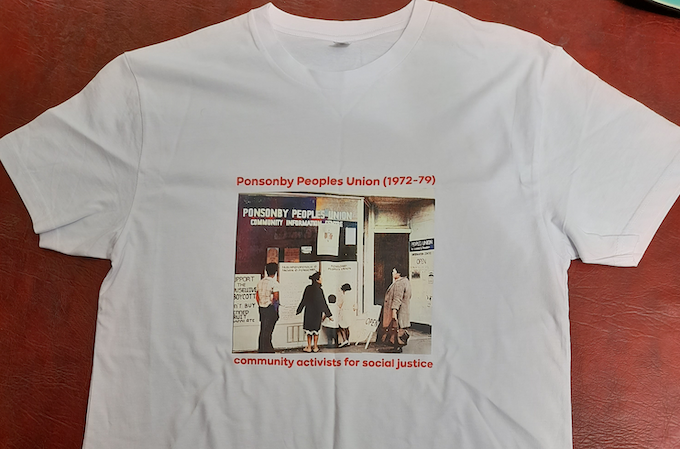
Pam Hughes was an activist in the PPU. She spoke about the impact of the anti-Vietnam War Movement and the writings of Karl Marx upon her early life. She said she felt she possessed theoretical but not practical knowledge of struggle until she moved to Auckland and joined the PPU in the middle 1970s.
She spoke about the lives of working-class women who lived in Grey Lynn, Herne Bay, and Ponsonby at the time.
Hughes spoke of the terrible hardship these women endured: these women had to make the weekly choice of either paying their rents or buying food for families — they did not have the money to do both.
She spoke of the impact of the 1973 oil crisis; the racism Māori and Pacific people faced during the period, and the emergence of the Dawn Raids strategy as an approach to Pacific “overstayers” initiated by Norm Kirk’s Labour government — before the strategy was intensified under Muldoon’s National government.
Hughes said the PPU had stood up for collective rights and improved living standards in inner city Auckland. She acknowledged the PPU as an early forerunner to contemporary community development programme initiatives in Aotearoa today.
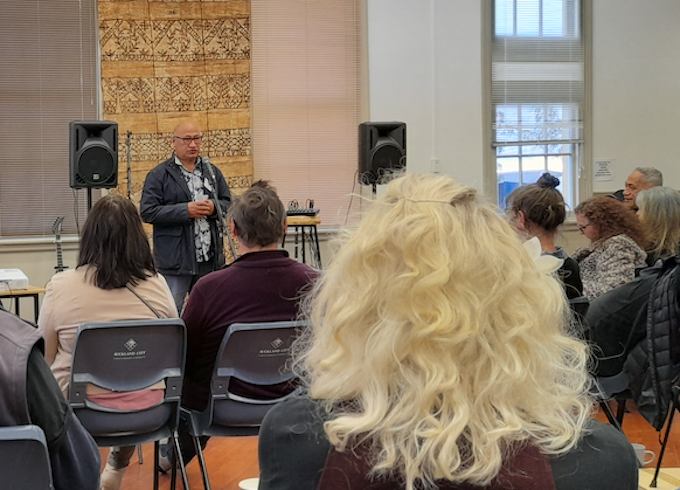
Fuimaono Norman Tuiasau is chairperson of the PPPLT and a former PPP member. He worked closely with the PPU from the early 1970s.
Fuimaono said he felt honoured to attend the 50th celebration for the PPU. He acknowledged all the brothers and sisters from different movements in attendance.
Fuimaono talked about the long, 50-year struggle of the PPU (and others) to uphold the mana of the poor, homeless, and lost in inner city Auckland. He talked about his deep alofa and gratitude for the PPU.
He told rich stories about the work the PPP did in partnership with the PPU. He told the story of how the PPP and the PPU worked together concerning the PPP’s Dawn Raids activist campaign.
Fuimaono talked about how the PPU, and PPP worked together to organise the PIG Patrol to monitor team policing in Auckland. He also shared the narrative of how the PPP assisted the PPU concerning tenancy eviction direct action activism in Ponsonby.
He acknowledged the PPU and his great friends, Roger Fowler and Lyn Doherty. He thanked the PPU for supporting the PPP.
At the conclusion of Fuimaono’s talk, PPP and PPPLT members Melani Anae, Tigilau Ness, Alec Toleafoa, and Fuimaono Norman Tuiasau stood together and sang the beautiful Samoan song “Ua Fa’afetai” to thank members of the PPU for their long years of community service.
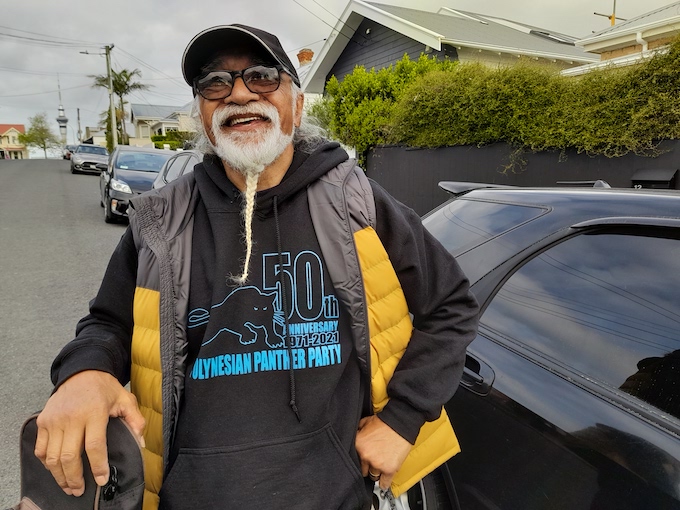
Tigilau Ness is a distinguished community activist, musician, PPPLT trustee, and former PPP member. He worked closely with the PPU from the early 1970s.
He offered warm salutations to the PPU at the 50th birthday celebration event. He spoke of how the loss of Panther sister Ama Rauhihi’s brother Peter in Vietnam galvanised the PPP’s anti-Vietnam War activism.
He articulated the bonds of fellowship between the PPP and the PPU via song. He performed songs such as “Teach Your Children”, and “American Pie” for the audience. These songs were sung by PPU and PPP members travelling on buses together to visit prisoners in Auckland.
Ness spoke about the importance of sharing histories of struggle with the youth of today. He spoke humbly about the community organising work the PPPLT do today speaking to youth in schools about PPP history. He warned that if activists did not tell their historical narratives, then outsiders might come and potentially misrepresent those stories.
Nick Bollinger is an eminent broadcaster and creative writer. He has written the important 2022 Aotearoa Counterculture Movement history Jumping Sundays: The Rise and Fall of the Counterculture in Aotearoa New Zealand.
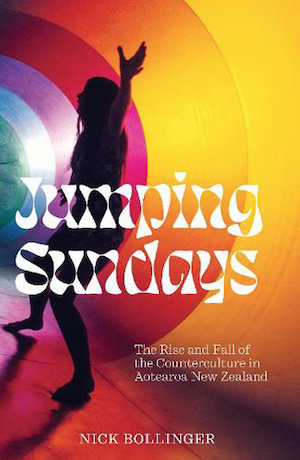
Bollinger evoked the 1960s as a period where communes formed, music festivals abounded, and younger Kiwis challenged social norms from hairstyles and dress codes to social assumptions concerning racism and sexism.
He talked about his book’s title and where the term “Jumping Sundays” came from. He said he wanted to explore ideas important to this emerging counterculture in his book. He wanted to explore whether ideas from this historical conjuncture had survived, been diluted, or had been hijacked.
Bollinger said he felt PPU’s ideas of community service still existed today in the lives and service of former PPU members. He talked about writing about the PPU in his book. He said that if we do not tell these stories, the stories will not survive. He quoted lines from Bob Marley’s renowned community struggle anthem, “No Woman, No Cry” to emphasise his point: “In this great future, you can’t forget your past.”
Alec Hawke is a Ngati Whatua activist and kaumatua. He collaborated closely with Roger Fowler and PPU members at the Takaparawhau Occupation in Tāmaki Makaurau in 1977-1978.
He talked about his early engagement in the anti-Vietnam War Movement as a high school student at Selwyn College in Tāmaki, and his involvement in anti-Vietnam War protests alongside the Progressive Youth Movement (PYM). Hawke spoke about the Takaparawhau struggle and said that Roger Fowler had asked protestors to remain peaceful as police arrested them at the Point in 1978.
Hawke said that Roger had supported Ngati Whatua kuia and kaumatua’s request that arrested protesters remain non-violent. He said Roger Fowler was the last person arrested at Takaparawhau because he refused to move off the wharenui roof!
Hawke thanked the PPP for always helping Takaparawhau protesters when his people called for assistance. He spoke about the death of his daughter Joannie at Takaparawhau: and how Tigilau Ness had written a beautiful song in tribute of Joannie. Alec said that Tāmaki Makaurau would not be the same place but for the work of Roger Fowler and Lyn Doherty.
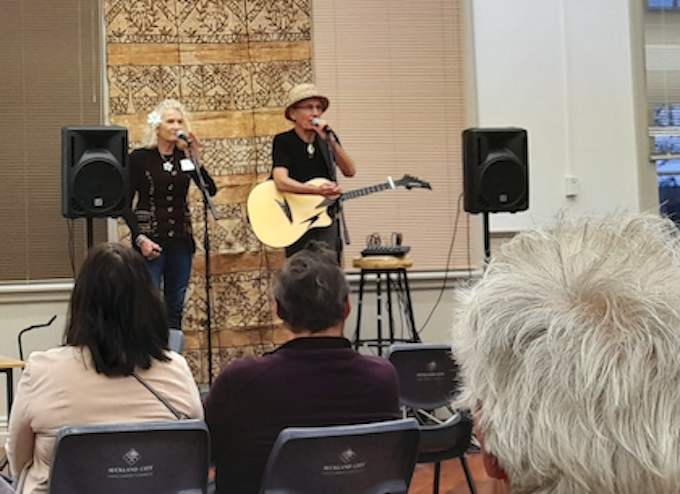
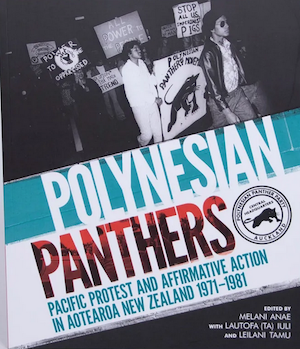
Musicians Sam Ford and Trudi Green performed for the PPU in the 1970s. They played several fine songs after Alec Hawke spoke. As Sam and Trudi performed their music, guests gathered to converse, share food, and mix and mingle.
Huey P. Newton once said, “I think what motivates people is not great hate, but great love for other people.”
Alongside other organisations and movements, the PPU embodied this great alofa/aroha for others in their tireless community labours. Their work offers living inspiration for new generations today.
The author, Tony Fala, wishes to pay respects to the work of all former PPU members living and deceased. People can send photographs and stories by October 31, 2022, to Roger Fowler for the PPU book project at: roger.fowler@icloud.com People can learn more about the PPU by reading Roger Fowler’s contribution in the important PPP history edited by Melani Anae, Lautofa (TA) Iuli, and Leilani Tamu in 2015 titled, Polynesian Panthers: Pacific Protest and Affirmative Action in Aotearoa New Zealand 1971-1981. Nga mihi nui to Roger Fowler for providing insightful editing comments concerning this article.
Article by AsiaPacificReport.nz







